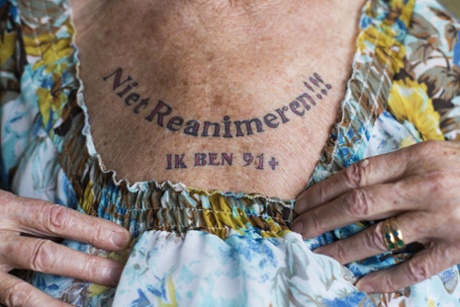
Almost one in five Dutch doctors would consider helping someone die even if they had no physical problems but were “tired of living”, according to one of the most comprehensive academic studies of such attitudes.
The research, in which almost 1,500 GPs, geriatric care doctors and clinical specialists answered a detailed, anonymous survey, also found that 2% of them said they had taken part in such euthanasia or assisted suicide without medical grounds for a patient who was suffering, even though this is prohibited under Dutch law.
The paper, published in the Journal of Medical Ethics, also found that 40% of the doctors said it was conceivable they would help someone in the early stages of dementia to die, while 3% had done so. Just over a third said they might also be willing to assist people with a psychiatric disease who wished to end their life.
The Netherlands has one of the world’s more liberal approaches to euthanasia and assisted dying. The practice was in effect decriminalised when doctors were permitted to plead a defence of necessity, arguing that their duty to relieve suffering superseded that to preserve life. This was codified in a 2002 law which lays down six preconditions, crucially that the patient faces “unbearable suffering without prospect of improvement”.
The law does not specify that this suffering must involve a physical illness or condition. However, a subsequent case in the supreme court ruled that in order for a doctor to properly assess the extent of suffering the main cause of this must be medical.
Nonetheless, the study found that 18% of the Dutch doctors would consider helping someone to die without them having any physical affliction if they were “tired of living”. Also, 27%, said they would possibly assist in a death of someone who had a medical condition but not a serious one. The authors concede that the self-selecting nature of the respondents – about 800 doctors were sent the questionnaire but did not return it – could skew the results slightly.
Eva Bolt, at VU University in Amsterdam, who led the study, said doctors seeking to help end the life of someone free from physical problems would be breaking the law. However, she added, this did not mean the 2% who admitted doing so had committed a crime: “It’s hard to say – it’s possible that these are physicians that performed euthanasia years ago, when there was no law, so we can’t say they didn’t abide by the law.”
The issue is also muddied by the fact that most elderly patients who wish to die will have some physical ailment or other, even if this is not the primary cause of their suffering. A 2011 position paper by the Royal Dutch Medical Association, the KNMG, noted that multimorbidity – a decline in several areas of health at once – can combine to be seen as unbearable, and that such factors, along with loneliness and loss of autonomy, should be “part of the equation physicians use to assess requests for euthanasia”.
The number of Dutch people taking advantage of assisted dying has increased considerably since 2002. In 2013, the last year for which data has been compiled, 4,829 people chose to get assistance from a doctor in end their lives.
Dementia is among the medical conditions seen as legitimately providing grounds for people to seek help in dying, even if it is at an early stage, though this is rare. In 2013, 97 people in the Netherlands with dementia died through euthanasia or assisted suicide. Virtually all these cases involved the early stages of the condition.
Patients can lodge a request for their life to end when their dementia advances, but this can be a difficult request to fulfil, according to Prof Penney Lewis, an expert on law and medical ethics at King’s College London, who has assisted other governments over assisted dying laws.
“If you’re a doctor and you have to provide euthanasia, emotionally that’s very taxing,” she said. “Imagine doing that for someone when you’re not able to say to them at the last minute, ‘Are you sure that this is what you want?’ Doctors don’t like doing that. They want to check, to be 100% sure.”
Such dilemmas are only a small part of assisted dying in the Netherlands. The study notes that 72% of such requests to doctors are from people with cancer. More than 80% of the doctors questioned said they would be willing to help in cases of cancer or other physical diseases.
Of those saying they would refuse any request to help someone die, two-thirds were religious, according to Bolt. But even among these, she added, the vast majority said they would be happy to refer the patient to a doctor who might be willing to help, and hardly any wanted the law repealed.
The high response rate to the questionnaire indicated the level of medical interest in the issue, Lewis said: “A lot of physicians think this is something we should talk about and they really want to get their opinion out there.”

